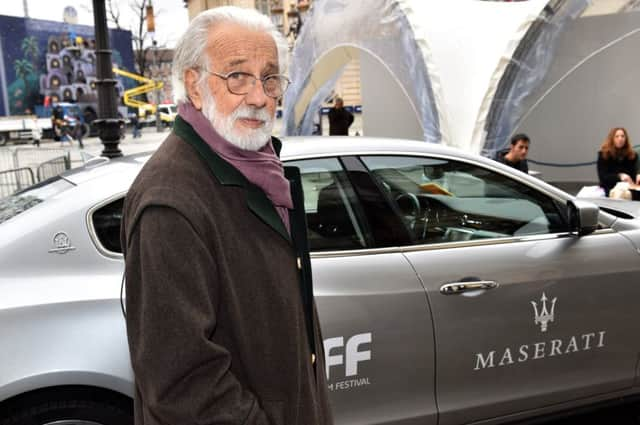Obituary: Luca Ronconi, theatre and opera director


Luca Ronconi was one Europe’s most influential theatre and opera directors – his work was seen in the leading theatres and opera houses, though seldom in Britain. His final appointment was artistic director of the Piccolo Teatro in Milan, where he had just opened an acclaimed new production The Lehman Trilogy based on the collapse of the Wall Street bank. Ronconi conceived many of his productions on a grand and hugely imaginative scale. The Last Days of Mankind by Karl Kraus, for example, Ronconi staged in Fiat’s vast assembly plant in Turin. It caused a sensation.
His work was twice seen in Scotland when he brought two of his epic productions to the Edinburgh Festival. In 1970 Ronconi brought the Teatro Libero to the Haymarket Ice Rink to perform Orlando Furioso. The production had been mounted at Gian Carlo Menotti’s festival in Spoleto and was then done in the main piazza in Bologna. It had a complicated story but the audience became involved in the drama through Ronconi’s brilliant invention and imagination.
Advertisement
Hide AdAdvertisement
Hide AdThe Edinburgh audience was certainly taken by it too. The Festival director, Peter Diamand, was keen to bring new drama to the Festival and opened the season at the Haymarket with a rock opera, Stomp, presented by American students. Full of colour, noise and performed all around the arena, the show broke new ground for the official festival.
But Stomp’s success was nothing compared with that of Orlando Furioso that followed. It was considered a totally new experience and a magnificent spectacle. Many of the scenes were performed in different parts of the arena simultaneously – it was styled a promenade performance – and the audience moved from one mobile pageant to another, thereby having to dodge the actors and the action.
It was more like circus than conventional theatre but was greeted nightly with acclaim and the critics raved.
Allen Wright in The Scotsman was mightily impressed. “A dramatic carnival swirled in to Edinburgh last night, taking the Festival by storm. This is a fantastic spectacle… it is a curious mixture of Speakers’ Corner and a medieval funfair. The production by Ronconi is full of happy inventions in the style of the Italian Renaissance.”
Then just to add to the theatrical chaos (and excitement) Ronconi ended with Orlando and his knights charging through the audience on mounted horses – really huge trolleys. They galloped at a fair lick and scattered everyone. The effect was stunning.
Diamand had described Ronconi’s production as a “dazzling and imaginative theatrical event”. It certainly proved to be that and Orlando is remembered as one of the great productions in the history of the Festival. Thereafter Orlando Furioso was performed throughout Europe and on Broadway; Vittorio Storaro directed a film with designs by Pier Luigi Pizzi.
Ronconi was back in Edinburgh with a company from Tuscany in 1975 – again at the Haymarket Ice Rink. It was a show based on Aristophanes’ Utopia but it was beset by epic problems. Again the production was billed as spectacular but getting the complicated sets from Rome proved a major difficulty.
Firstly, the plane ran out of fuel and the Italian customs wanted to inspect the cargo, which contained battered cars and a biplane. The delay was worsened when the British authorities impounded the sets and costumes at Stanstead. The plane eventually arrived at Edinburgh Airport too late for the first performance, which was cancelled.
Advertisement
Hide AdAdvertisement
Hide AdTypical of a Ronconi production, it was no easy evening. It lasted more than four hours and many left before the end; the hard wooden benches at the Haymarket did not help. Diamand pleaded with Ronconi to make cuts and a shortened version was seen for four performances. But Ronconi had the last word – the four-hour version was performed on Friday and Saturday. The production made a strong impact on young Festival-goers and the last performances were sold out.
Ronconi studied drama in Rome and then worked as an actor for many years in Italian theatres. In 1966 he directed The Changeling, which he set in a lunatic asylum. Other successes included a powerful Measure for Measure at the Royal Palace in Turin.
His many opera productions included Rossini’s seldom heard Il Viaggio a Reims at the Pesaro Festival in 1984, conducted by Riccardo Muti. Ronconi started the evening in the streets of Pesaro with the audience (literally) following the action of travellers on their voyage to Reims.
Controversy hit a 2002 production of Aristophanes’ The Frogs in Syracuse. Ronconi had included in the sets for the play caricatures of the Italian premier Silvio Berlusconi. The management had to point out to Ronconi that the theatre was centrally funded and the director reluctantly agreed to remove the designs.
Ronconi never married and considered his actors to be his spiritual heirs.